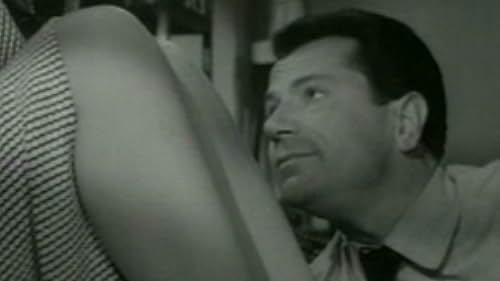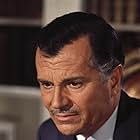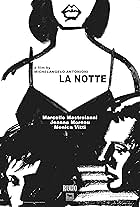A woman disappears during a Mediterranean boating trip. During the search, her lover and her best friend become attracted to each other.A woman disappears during a Mediterranean boating trip. During the search, her lover and her best friend become attracted to each other.A woman disappears during a Mediterranean boating trip. During the search, her lover and her best friend become attracted to each other.
- Nominated for 2 BAFTA Awards
- 6 wins & 12 nominations total
Prof. Cucco
- Ettore
- (uncredited)
Storyline
Did you know
- TriviaAt its premiere at the 1960 Cannes Film Festival, this was booed so much to the extent that Michelangelo Antonioni and Monica Vitti fled the theater. However, after the second screening there was a complete turn around in how it was perceived and it was awarded the Special Jury Prize, going on to become a landmark of European cinema.
- GoofsWhen Sandro and Gloria make love, her nipple is unintentionally revealed and she quickly hide it.
- ConnectionsEdited into Histoire(s) du cinéma: Seul le cinéma (1994)
- SoundtracksMai
(uncredited)
Written by Silvana Simoni (as Simoni), Aldo Locatelli (as Locatelli), Arturo Casadei (as Casadei), and Aldo Valleroni (as Valleroni)
Performed by Mina
[sung along to by Monica Vitti]
Featured review
Gorgeous film, with devastating commentary on relationships. Early on there is something raw and elemental about the dramatic setting, an island with the sea roaring around its craggy inlets, rock formations that look ancient, and the wind howling as it blows up a storm. The people that have come to this place on a pleasure cruise off the coast of southern Italy are generally all unhappy or dissatisfied, most of them with the person they're in a relationship with. When Anna (Lea Massari) suddenly goes missing, a search ensues.
I loved the premise, and loved even more where the film went from there. Sandro (Gabriele Ferzetti), Anna's fiancé, begins pursuing her friend Claudia (Monica Vitti) from the first day of her absence, which is pretty shocking. And the further the action moves away from the island and we see the other characters either getting on with their lives (most of which involve infidelities of their own), or making what seems to be a pretty distant effort to know what's happening, the more we wonder, but what about Anna? If it were a conventional film, I'd be thinking that given the guy starts dating her girlfriend pretty much immediately after she goes missing, why are the police not investigating him? Or questioning a character named Corrado, who had gone off in a boat to a smaller island right beforehand? But the film is not meant to be a mystery, it's making a point about the human condition.
What does it mean to live one's life how one wants, to seek happiness, and to be able to adapt and move on, things that you might think would all be positive, at least to some degree? Does it mean inherent selfishness, infidelity, and unkindness? And can monogamous relationships survive in a world where little dissatisfactions set in, and there is always another person to be attracted to? I thought the film was well paced and had no issues with its length, as it allows subplots to develop, and the longer it went, the more it caused me to occasionally wonder ... what about Anna? And is this what we do to the people in our lives, pushing them out of mind when it becomes convenient? I loved how the film stayed artistically pure, seeking its vision, without caving in and giving us canned or artificial moments. And in that last moment, what I saw as forgiveness for what is an unforgiveable act ... perhaps it signals something that seems pretty depressing, that infidelity is inevitable, and it takes an almost divine act like that hand on the back of the head to stay together as a couple.
Through it all, director Michelangelo Antonioni gives us a beautiful, beautiful film. His compositions and attention to detail - in grand, sweeping shots and those that are closer - are wonderful. There are countless scenes that are visually appealing, and while it felt like there was a unifying theme in the aesthetic, he seems to experiment a little, such as that great shot from the boat back towards the dock, lightly bobbing with the waves, and the rocky island rising up in the background.
Some other little bits:
I loved the premise, and loved even more where the film went from there. Sandro (Gabriele Ferzetti), Anna's fiancé, begins pursuing her friend Claudia (Monica Vitti) from the first day of her absence, which is pretty shocking. And the further the action moves away from the island and we see the other characters either getting on with their lives (most of which involve infidelities of their own), or making what seems to be a pretty distant effort to know what's happening, the more we wonder, but what about Anna? If it were a conventional film, I'd be thinking that given the guy starts dating her girlfriend pretty much immediately after she goes missing, why are the police not investigating him? Or questioning a character named Corrado, who had gone off in a boat to a smaller island right beforehand? But the film is not meant to be a mystery, it's making a point about the human condition.
What does it mean to live one's life how one wants, to seek happiness, and to be able to adapt and move on, things that you might think would all be positive, at least to some degree? Does it mean inherent selfishness, infidelity, and unkindness? And can monogamous relationships survive in a world where little dissatisfactions set in, and there is always another person to be attracted to? I thought the film was well paced and had no issues with its length, as it allows subplots to develop, and the longer it went, the more it caused me to occasionally wonder ... what about Anna? And is this what we do to the people in our lives, pushing them out of mind when it becomes convenient? I loved how the film stayed artistically pure, seeking its vision, without caving in and giving us canned or artificial moments. And in that last moment, what I saw as forgiveness for what is an unforgiveable act ... perhaps it signals something that seems pretty depressing, that infidelity is inevitable, and it takes an almost divine act like that hand on the back of the head to stay together as a couple.
Through it all, director Michelangelo Antonioni gives us a beautiful, beautiful film. His compositions and attention to detail - in grand, sweeping shots and those that are closer - are wonderful. There are countless scenes that are visually appealing, and while it felt like there was a unifying theme in the aesthetic, he seems to experiment a little, such as that great shot from the boat back towards the dock, lightly bobbing with the waves, and the rocky island rising up in the background.
Some other little bits:
- Anna had two books with her on the trip, F. Scott Fitzgerald's 'Tender is the Night' and the Holy Bible. I liked how the father conveniently disregarded the first, with its themes on the unhappiness in marriage, and took the Bible exclusively to mean that she hadn't committed suicide. We see what we want to see.
- Just as human relationships are subject to impermanence maybe out of neglect, one of the people clumsily drops an ancient vase discovered in one of the island's caves, and it makes no difference to them.
- There is reverence for the freedom and spacing of the architectural style of ancient buildings which have survived, but our lives seem so dreadfully transient in comparison. In one scene Ferzetti's character deliberately tips over an inkwell on an artist's drawing, seemingly out of spite. I wondered if he was jealous of youth, or jealous of having sold out on his old dreams to become more of a businessman than an architect - sensing his own mortality, or his compromises in a too-short life.
- In keeping with the elemental early scenes and the commentary on the fundamental nature of people, there was something primal about the very aggressive southern Italian male gaze from dozens of men in a large crowd around Monica Vitti in one scene, which was very creepy.
- Favorite quote, Anna at about the 25 minute mark:
- gbill-74877
- Oct 26, 2019
- Permalink
- How long is L'Avventura?Powered by Alexa
Details
- Release date
- Countries of origin
- Languages
- Also known as
- Pustolovina
- Filming locations
- Basiluzzo Island, Aeolian Islands, Messina, Sicily, Italy(scenes of swimming in the sea where Anna claims to have seen a shark)
- Production companies
- See more company credits at IMDbPro
Box office
- Gross worldwide
- $2,606
- Runtime2 hours 24 minutes
- Color
- Sound mix
- Aspect ratio
- 1.85 : 1
Contribute to this page
Suggest an edit or add missing content































